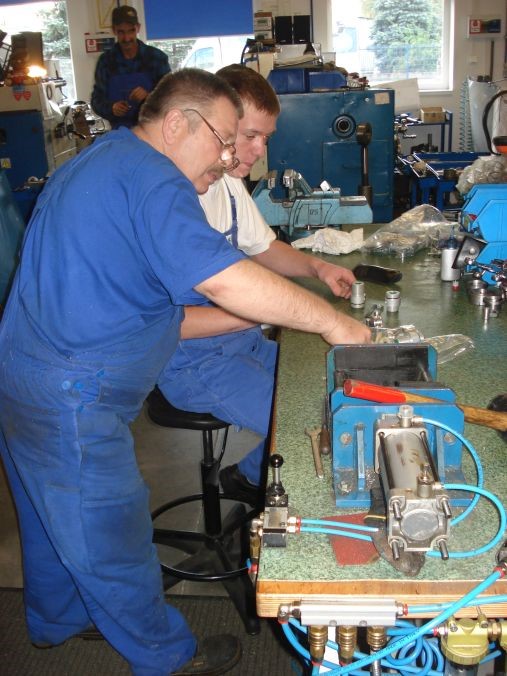Which concrete experiences from and with mobility projects have managers and teachers in German VET gained? The German partner in the ENNE team, Wisamar, enquired.
What are the chances of mobility for learners, vocational schools and companies? Can you give examples from your practice that have worked very well? And in your experience, what are the main difficulties in organising and implementing mobilities? These are some of the questions, which Wisamar asked to actors in German vocational schools, who are responsible for European exchange projects there.
Coming back with more self-confidence
The interviewees agree that there are many advantages for VET students who complete a mobility abroad. It is a very important experience for young people and their personal development. In general, they come back more worldly and open-minded. “They simply think outside the box,” says a vocational school teacher from Flensburg. “They gain flexibility and self-confidence and then also appear much more confident in the workplace. In addition, they generally improve their language skills, of course, which is also a great advantage for their training company. On the other hand, the chance of a stay abroad increases the attractiveness of the apprenticeship place: “Knowing that I will participate in a mobility during my training makes it much more interesting, of course,” explains one interviewee.
For some of the VET students, the work placement is their first stay in a foreign country. Erasmus+ also enables trainees from families with lower incomes to do an internship abroad. The number of people who go abroad for an internship after finishing their vocational training is increasing, according to the mobility adviser from a business school, because immediately afterwards they have the opportunity to stay longer in another country. During a two to four-week stay abroad, the trainees did not always learn a lot of new things in their profession, “but afterwards they are better equipped to assert themselves in unfamiliar situations.”
Experience enrichment as a host company
Vocational training staff or students do not always have to go abroad to broaden their horizons, emphasizes an interviewee from Leipzig. Visits to one’s own institution by vocational trainers and trainees from other countries are always an enrichment and variety in the daily routine. And sometimes they bring a breath of fresh air into the company where they are doing their internship abroad: One interviewee told us that Italian trainees developed the social media presence for their German host company and then explained and showed it to their German colleagues.
The motivation to organise mobilities despite all obstacles and difficulties stems from the enthusiasm and excitement of the trainees returning from their mobility, explained a vocational school teacher from Pinneberg. The students often do not see the negative points at all or find a way to turn them into positive learning experiences and actively use their time abroad.

Suitable internships, legal framework and huge responsibility
But what are the problems faced by Erasmus+ actors? Finding really suitable placements for trainees is difficult, many of the interviewees’ stress. Some schools work with intermediary organisations in other countries and are not always satisfied with the quality of the placements allocated. The placements often did not really fit the profile of the trainees. This sometimes leads to frustration among the trainees, according to the teacher from Pinneberg.
Another interviewee said that the main obstacle in organising mobility is the different legal regulations of the countries. In Sweden, for example, it is not allowed to work without payment, and it has to be clarified that trainees receive a scholarship, etc. Someone has to take responsibility for organising everything, including planning the trip and booking tickets and accommodation. This is very time-consuming. Furthermore, it is a huge responsibility as an accompanying teacher when traveling with a group of VET students, emphasises an experienced vocational school teacher. “It took a load off my mind every time when everyone was safely back at their home station.” A well-designed programme is also very important, she says, that does not overburden the pupils and does not overestimate their independence. Many of them have never been away from home alone, have never used a plane or travelled far away.
Exemption by the partner companies
However, not only the organisation of the stay and programme abroad is perceived as challenging, but also the cooperation with the partner companies in Germany, where the young people complete the practical part of their training, is not always easy. According to the experience of one vocational school teacher interviewed, the partner companies are not so interested in sending their trainees abroad. Although the stay abroad often takes place during the trainees’ school time and not during their time in the company, one company has already opposed this so that not too many lessons are missed. It happens again and again that apprentices take leave in order to be able to participate in a mobility. It should be normal that apprentices receive an official leave of absence from the company for their mobility.
Special challenge COVID19
This year, COVID19 of course made it very difficult to carry out mobilities: Many of the planned stays abroad were cancelled or, if possible, postponed until 2021. Only few individual mobilities are still taking place. Due to the situation, those who still want to do their internship abroad prefer to travel to neighbouring countries like Denmark or Austria. They don’t want to be too far away from home. Two interview partners from VET schools stated that the willingness to participate in mobilities has decreased among trainees and VET staff due to the COVID 19 pandemic. They don’t want to take such risks. Other reasons were liability and the question of who is responsible if mobilities cannot take place as planned. That is why everything is being planned with reservations. It needs to be avoided that trainees would be burdened with the costs if the mobility cannot take place. Another interviewee stated that the trainees themselves still wanted to go abroad, but that their companies in Germany as well as host companies in the other countries are more hesitant.
The companies’ view
In addition to this brief insight into mobility experiences of vocational training institutions in Germany, the next ENNE newsletter will present the viewpoint of companies, represented by various Chambers of Industry and Commerce and Chambers of Crafts. Wisamar has also talked to some representatives – so stay tuned!





